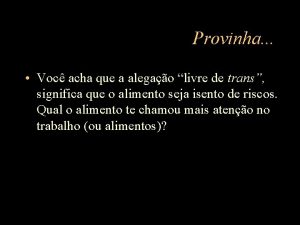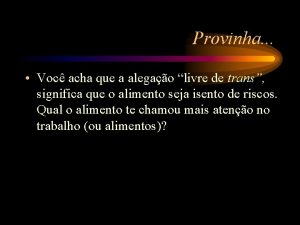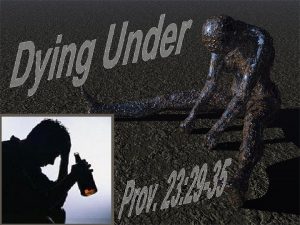Deconstructing Authority in Dario Fos Accidental Death of













- Slides: 13

Deconstructing Authority in Dario Fo’s Accidental Death of an Anarchist Srirupa Chatterjee, IIT University, India.

Introduction �The play is a sharp and hilarious satire on police corruption in Italy �It illustrates the atrocities of an authoritarian regime �It calls for an egalitarian rearrangement of society ◦ Though it not a blind advocacy for the cause of the left (socialism/communism) either.

Background Information �Written in 1970 �Based around the true incident of a murder of a Milanese railway worker under the tyrannical regime of the Christian democratic government in Italy. �The play can be described as an “agit-prop” play ◦ Political propaganda - chiefly in literature, drama, music, or art (Agitation-Propaganda) �Fo produced a number of plays expressing his dissent against the Italian government in the 1960 s and 1970 s

Background Information �Fo and his wife, Franca Rame, started performing their plays for working class audiences �Fo’s theatre is politically vocal, fighting for an egalitarian social setup �His ideal democratic state was one free from the corruptions of extremist politics on both sides – be it fascism or communism �The play is the practical application of the politics of subversion

Background Information �The destabilising effects of deconstructing authority acts as a leitmotif throughout the play ◦ (a dominant, recurring theme) �Fo not only debunks fascist ideology – but also undoes the counter -narrative by voicing it through a madman

Historical Context �In Italy in the 1950 s and 60 s, there was a revival in fascism as well as vocal opposition from the left � 1959 – Christian Democrat government, led by Fernando Tambroni, was installed with the support of the neo-fascists with links to the rule of Mussolini �Protests and violence escalated on both sides – and there were instances of police firing on ant-fascist protestors.

Historical Context �On December 12, 1969, a bomb exploded at the Bank of Agriculture in Milan � 16 people were killed and 100 were injured �Giuseppe Pinelli, a 41 year old railway worker, was arrested �He later “fell” from the fourth floor of the Milan police station �Left-wing magazines like Lotta Continua were vocal in blaming the police inspector, Calabresi

Fo and the Play �Fo said, “the job of theatre is not to document filth but transform it into fertiliser. ” �Irony is the main device used to deconstruct the police’s version of Pinelli’s death ◦ Conflicting layers of meaning ◦ The layers are interconnected and also undo each other

The “Jongeleur” �Fo incorporates the “jongeleur” a figure from Italian history �A street performer, similar to a Shakespearean “fool” �The madman becomes the voice of subversion that contests the “official” version of events from the police �The central paradox in the play concerns a maniac who claims to be “certifiable” but manipulates fiction to reveal the truth

The Maniac �A self-proclaimed patient of “histriomania” (compulsive impersonator) �Adopts various roles of authority ◦ Judge ◦ Psychiatrist ◦ Rabbi �He tricks the policemen to acknowledge their crime by trapping them in their own fabrication

Criticism of the Left �Feletti enters in the last scene of the play �Like the maniac, she purports to be a “voice of the people” �However, neither Feletti, nor the maniac, are ideal spokespersons for democracy �This is shown by Feletti’s statement on the media’s “hunger” for scandal ◦ “Scandal, manure, social democracy” �Media, instead of empowering the people, is really an accomplice of the agents of tyranny

Criticism of the Left �Fo criticises the tyrannies of the right �Though he is not sympathetic to the cause of the extreme left either

Final points � The play concludes with a note of openendedness � While the maniac exposes the lies and corruption of the police, there is a paradox that this counter-narrative comes from a lunatic with numerous personas � The play, arguably, then makes no claim on truth-values � The play’s purpose is social critique � Ponders the process of reform instead of tearing down the state. ◦ For Fo, tearing down the state defers democracy.
 Non accidental death
Non accidental death Non accidental death
Non accidental death Gondrand port saint louis du rhone
Gondrand port saint louis du rhone Master fos
Master fos Monossacarídeos dissacarídeos e polissacarídeos
Monossacarídeos dissacarídeos e polissacarídeos Probezeit fos nicht bestanden
Probezeit fos nicht bestanden Frutooligossacarídios (fos) são:
Frutooligossacarídios (fos) são: Numeri fos
Numeri fos Fos/tac
Fos/tac Meme yapısı
Meme yapısı Webuntis fos bos donauwoerth
Webuntis fos bos donauwoerth What is line authority
What is line authority Deconstructing media examples
Deconstructing media examples Convenience sampling
Convenience sampling























